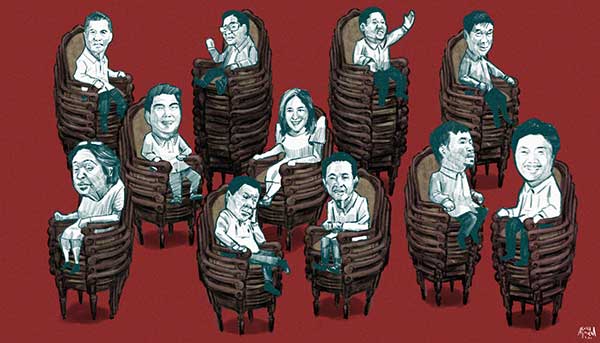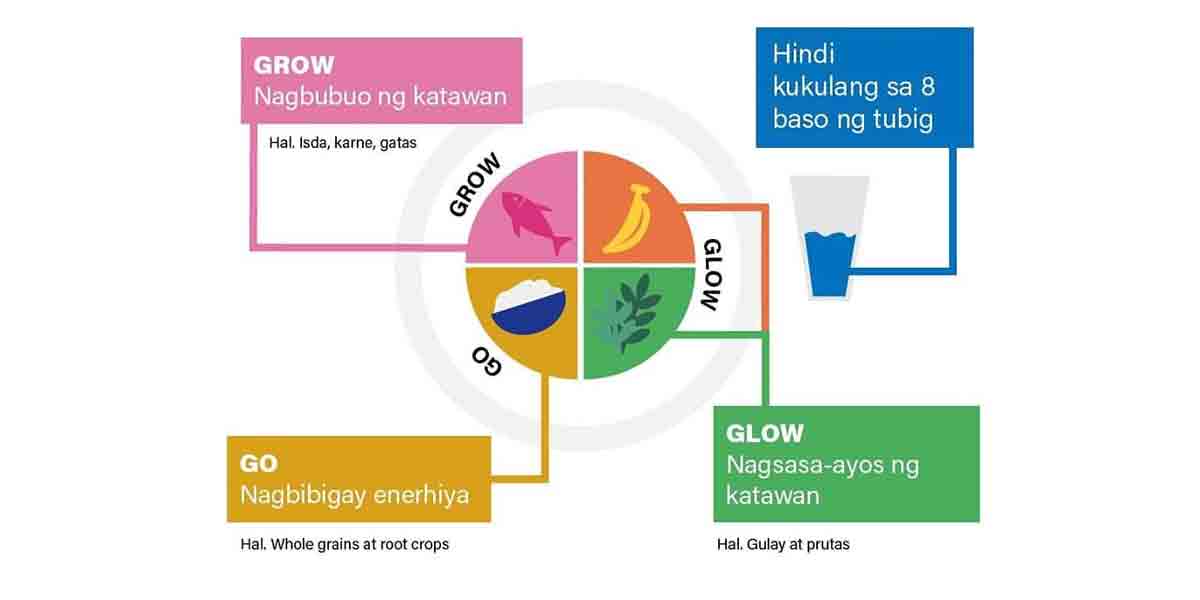
By Guinevere Latoza and Maujerie Miranda
Philippine Center for Investigative Journalism
Second of two parts
The Sanggunian Kabataan (SK) law and Bangsamoro Electoral Code define and prohibit political dynasties. However, these laws only cover the SK and Bangsamoro parliamentary elections.
In national and local elections, clans continue to consolidate political and economic power.
Based on the electoral plans for May 2025 of district representatives belonging to political dynasties, here are five ways they are able to stay in power.
- Max out term limits
- Seek higher positions, swap with relatives
- Expand to new provinces, cities, and towns
- Intra-family rivalry
- Join the party-list race
- Max out term limits
The Constitution allows politicians to hold local office for three consecutive three-year terms or a total of nine uninterrupted years.
In the current 19th Congress, 142 district representatives are reelectionists belonging to political dynasties , PCIJ’s own count shows.
They represent more than half of the 253 district seats.
The entire province of Ilocos Norte is dominated by reelectionist dynasts, with presidential son Ferdinand “Sandro” Marcos (1st District) running for a second term and his uncle Angelo Marcos Barba (2nd District) fighting for a third term.
Since the Marcoses returned to the Philippines in 1991, they have uninterruptedly reigned over Ilocos Norte’s 2nd District. But the 1st District was only recently captured by the clan, in the 2022 elections ,when Sandro Marcos beat Ria Fariñas, a member of a rival political family.
In Leyte, each of its five congressional districts is held by a different political dynasty member: House Speaker and presidential cousin Ferdinand Martin Romualdez (1st District), Lolita Javier (2nd District), Anna Victoria Veloso-Tuazon (3rd District), Richard Gomez (4th District) and Carl Nicolas Cari (5th District). They all plan to keep their posts.
Other provinces where all districts are represented by reelectionist dynasts include Misamis Occidental and Misamis Oriental in the Visayas, and Cotabato, Lanao del Sur, Maguindanao del Norte and Maguindanao del Sur in Mindanao.
Many elected members of political dynasties maximize the three terms.
It is easy for them to get reelected because of the “incumbency advantage,” said political science professor Julio Teehankee.
“If you’re elected, you have all the resources of the state. And if you’re elected as a member of the House of Representatives, you have a pork barrel and all sorts of projects to show to your constituencies,” he said.
“The longer you stay in power, the more likely you will accumulate it… the more likely you will pass it on to your relatives,” Teehankee said.
Legal Network for Truthful Elections (LENTE) Executive Director Rona Ann Caritos said many incumbent officials are guilty of abusing state resources to aid their campaigns.
LENTE defines abuse of state resources (ASR) as “the misuse of government resources – whether material, human, coercive, regulatory, budgetary, media-related, or legislative – for electoral advantage.”
These commonly take the forms of social welfare programs and the use of government transportation, she said.
Caritos said Comelec can do its part by monitoring how state resources are reduced during election campaign seasons. “We’ve managed to convince Comelec to take on monitoring ASR hopefully in the 2025 elections… That’s another step also of somehow tempering the political dynasties,” she told PCIJ.
- Seek higher positions, swap with relatives
What happens when their terms run out? There are those who seek higher office, like many of the incumbent senators who started their careers in the House of Representatives.
Others do not wait.
Las Piñas City Rep. Camille Villar is seeking a Senate seat after two terms in the House of Representatives. She is swapping places with her mother, Sen. Cynthia Villar, who is sliding back to run for a seat in the House of Representatives.
It is Sen. Villar who is reaching her term limit in the Senate next year. She dropped initial plans of running for mayor of Las Piñas City.
It’s the same for Lanao Del Norte Rep. Mohamad Khalid Dimaporo, who will run for governor in 2025. He is swapping positions with his mother, Gov. Imelda Dimaporo, whose third term will end next year.
PCIJ research shows that 67 outgoing district representatives have opted to seek higher positions or switch positions with family members. Nearly half of them are term-limited.
In Masbate, a father and mother will swap roles with their children as district representatives.
Outgoing Masbate Gov. Antonio Kho is running for 1st district representative, a seat currently held by his son Ricardo Kho, who is joining the gubernatorial race. Meanwhile, Antonio’s wife, Vice Gov. Elisa Kho, will contest her daughter Olga “Ara” Kho’s congressional seat in the 2nd district.
Ara is eyeing the mayoralty post of Masbate City, while her brother Wilton Kho seeks reelection as 3rd district representative.
In Valenzuela, neophyte Kenneth Gatchalian is gunning for the position of 1st district representative, a seat previously held by his brothers Senator Win, Valenzuela Mayor Wes, and most recently Rex, who resigned when he was appointed as secretary of the Department of Social Welfare and Development.
Marikina Mayor Marcelino “Marcy” Teodoro seeks to replace his wife, Rep. Maan Teodoro (Marikina City, 1st District), in the House. The same scenario is true in the city’s 2nd district, where former House deputy speaker Miro Quimbo is contesting his wife Rep. Stella Quimbo’s seat. Both wives will face off in the mayoralty race.
In Negros Oriental’s 3rd District, a Teves has held the congressional seat since its creation in 1987, a legacy now set to continue with Janice Teves Gaston, aunt of expelled Rep. Arnolfo Teves Jr., running for the seat. He was removed from office following allegations of involvement in the assassination of Negros Oriental Gov. Roel Degamo.
Elsewhere, political families are fielding their sons as candidates: the Silverios in the 1st District of Bulacan, the Collanteses in the 3rd District of Batangas, and the Barzagas in the 4th District of Cavite. In each case, the sons are set to replace their congressmen-parents, who themselves succeeded one another.
Sen. Juan Miguel Zubiri’s wife Audrey Zubiri is running for the seat of her father-in-law Rep. Jose Maria Zubiri Jr. in Bukidnon’s 3rd District.
Without a law prohibiting political dynasties, the term limits sped up the entry of the next generation of dynasts, said Teehankee.
Before martial law, he said there were only a few political dynasties because there were no term limits. A politician could occupy the same positions for as long as he is reelected. “The framers of the constitution introduced term limits, thinking it would deepen democracy [and] open up the seats for non-dynastic candidates.”
“That was a toxic combination. You introduce term limits without anti-political dynasty legislation. It accelerated the rise of dynasties. The unintended consequence was that they multiplied,” Teehankee said.
- Expand to new provinces, cities, and towns
Political families have also expanded their influence to other provinces to consolidate their power, which Caritos referred to as “franchising.”
“They’re not content with their original territory, so they expand as well to nearby territories,” she said.
Mark Cojuangco, from the prominent dynasty in Tarlac, is seeking reelection as Pangasinan’s 1st District representative. His wife, former mayor and congresswoman Kimi Cojuangco, is a native of Pangasinan.
The Cojuangco dynasty began with patriarch Eduardo “Danding’’ Cojuangco’s election as Tarlac governor in 1967. Since then, other family members have held various political positions.
Meanwhile, the Suansing family holds sway in both Nueva Ecija on the main island of Luzon and Sultan Kudarat in Mindanao.
Term-limited Rep. Horacio Suansing Jr. (Sultan Kudarat, 2nd District) is passing the torch to his daughter Bella. His other daughter Mikaela is running for reelection as Nueva Ecija’s 1st District representative, a seat previously held by her mother Estrellita.
In Taguig’s 2nd District and San Juan, sisters Amparo and Ysabel Zamora are seeking reelection as representatives, respectively. They are daughters of former San Juan Rep. Ronaldo Zamora.
- Intra-family rivalry
Rivalry heats up in several provincial districts as family members vie for the same positions, mostly likely securing the seat within the family.
In La Union’s 1st district, the congressional race is a face off between Joy Ortega and her cousin, incumbent Rep. Francisco Paolo Ortega V.
Similarly, in Iloilo’s 5th district, Niel Tupas Jr. is challenging his sister-in-law Binky Tupas, wife of outgoing Rep. Raul Tupas, for the same seat.
In Nueva Ecija’s 2nd district, siblings Mario Salvador and Micaela Salvador Violago, wife of incumbent Rep. Joseph Violago, are vying for the same position.
Former Comelec Commissioner Luie Guia likened these family rivalries to the boxing sport. They serve only to entertain the voters, he said.
In the end, Guia said, voters are not sure if one winning over the other will bring change.
- Join the party-list system
Political dynasties have also been occupying party-list seats in the House of Representatives, which has allowed clans to hold up to three seats in the legislative chamber.
Many family members of incumbent district representatives are running in the party-list race.
Speaker Romualdez, who is seeking reelection as Leyte’s 1st District representative, is introducing his son Andrew to politics through the party-list system. The younger Romualdez is set to replace his mother Yedda as first nominee for the Tingog party-list group. Yedda is the sixth nominee.
Tingog is one of several regional party-list groups that has allowed political clans to expand their political influence.
The Tulfo can also have three nominees in the party-list elections. Sen. Raffy Tulfo’s wife, ACT-CIS Rep. Jocelyn Tulfo is seeking her third term. The senator’s sister, former Tourism Secretary Wanda Tulfo Teo, is also the first nominee of a new Ang Turismo party list group. Teo’s son is the third nominee.
The flawed party-list system has been criticized as a “backdoor” to the House for political dynasties and big businesses.
Caritos said adding an anti-dynasty provision in the Party-List System Act could prevent political families from taking advantage of the system. But like the passage of an anti-dynasty law, she isn’t hopeful that this will be passed in the near future.— PCIJ.org
PCIJ’s series on political dynasties is led by PCIJ Executive Director Carmela Fonbuena. Resident Editor TJ Burgonio is co-editor.
The reportorial and research team includes Guinevere Latoza, Aaron John Baluis, Angela Ballerda, Maujeri Ann Miranda, Leanne Louise Isip, Jaime Alfonso Cabanilla, Nyah Genelle De Leon, Luis Lagman, Jorene Louise, Joss Gabriel Oliveros, and John Gabriel Yanzon.
PCIJ Resident artist Joseph Luigi Almuena produced the illustrations.






















